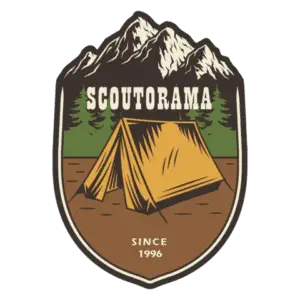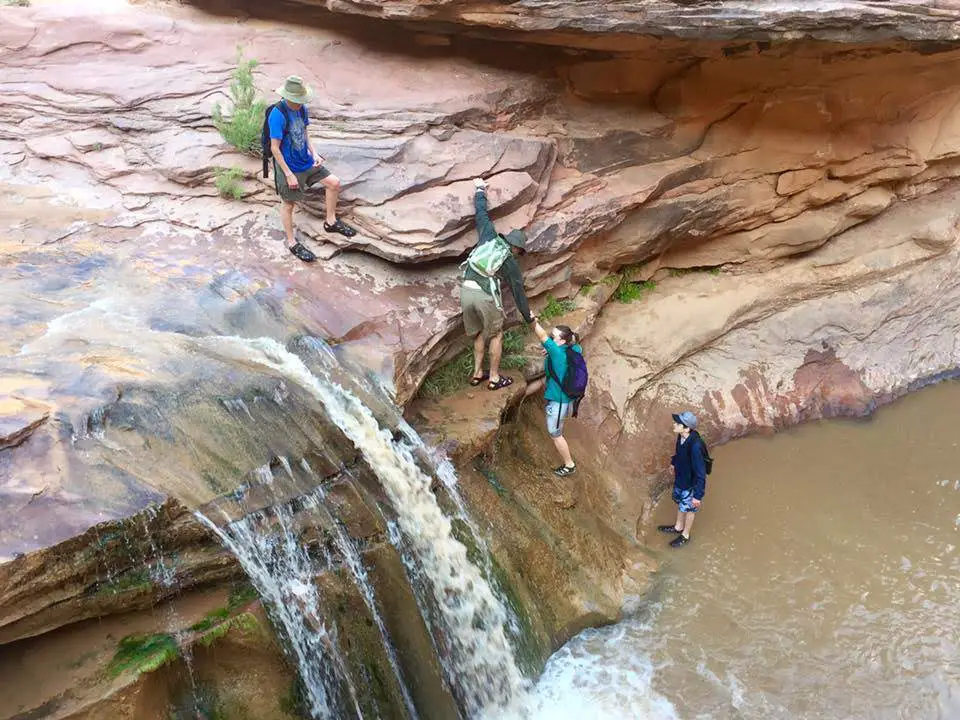I have spent hundreds of nights out camping or backpacking throughout my life. I’ve been with family, with scouts and youth groups, and with friends. I’ve also led trips with each of these groups. I love both camping and backpacking, and each one has its own time and place.
What’s the difference between Camping and Backpacking? Backpacking is a form of camping where you hike to a new location to spend the night carrying your equipment with you. With backpacking you are limited to the amount of gear you can fit in your pack, and gear can be more expensive. Backpacking is often more remote and secluded than camping.
Camping versus Backpacking
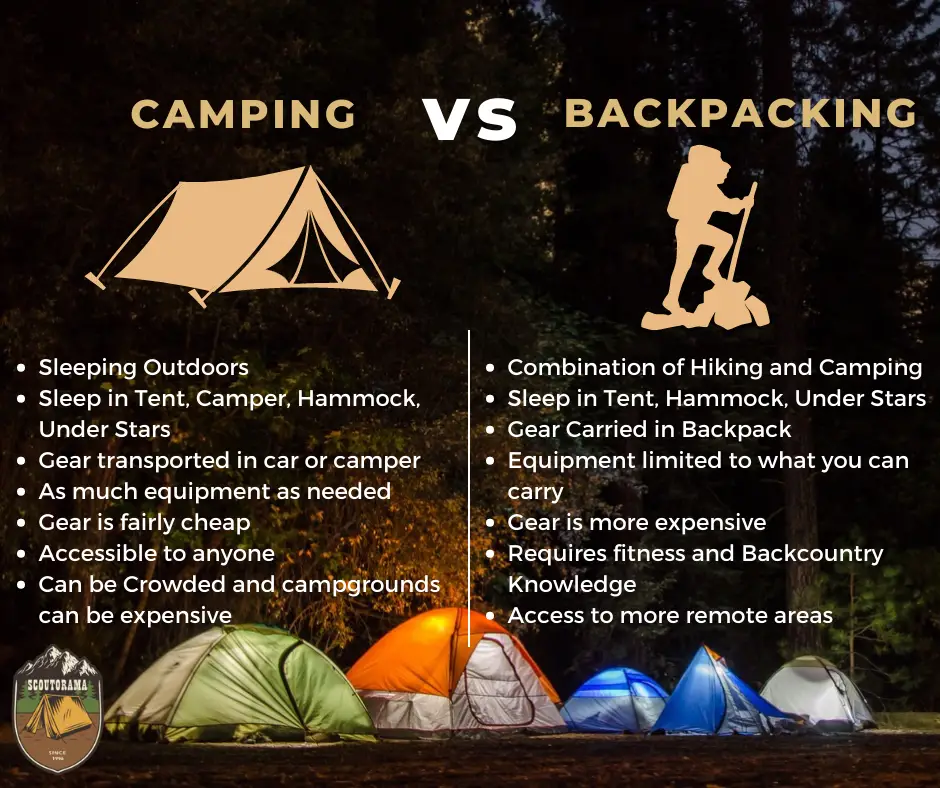
Pros and Cons of Camping
I consider camping ‘sleeping out.’ That usually means in a tent, but can also mean sleeping under the stars, in some sort of camper trailer (or even RV), or sleeping in a campervan or in a car. I’ve compared and contrasted these types of camping elsewhere (and argued for why tent camping is the best ), but all of them can be loads of fun.
), but all of them can be loads of fun.
As a further definition of camping, I’d argue that 1) you need to stay overnight and 2) staying in a cabin doesn’t count (but a yurt does maybe?). Under this definition, backpacking is also considered camping unless you stay in some sort of hostel or hotel.
Many of the advantages listed below for camping also apply to backpacking, so if you want a true comparison review the list below for the pros and cons of backpacking.
Advantages of Camping
Freedom
The top reason most people go camping is probably just to escape the day-to-day mundane city life. As I’ve lived in different places I’ve found that my desire to go camping is a lot higher when I’m in bigger cities farther from green spaces. On the other hand, when I live somewhere smaller with closer proximity to outdoor adventures I don’t feel as much of a draw to go camping.
Studies have found that spending a night or two outside can help you re-calibrate your circadian rhythm and also reduces symptoms of depression and improves self-esteem. (source ) It’s incredibly healthy, and sure seems to open your mind as you reconnect with nature.
) It’s incredibly healthy, and sure seems to open your mind as you reconnect with nature.
With camping you aren’t limited to how far your legs can carry you or how much you can fit in your pack. You can bring the necessities as well as some fun stuff like dutch ovens or cornhole.
Nature
In tandem with the feelings of freedom are the many benefits of spending time outside in nature. It seems that every year a new study comes out that preaches the benefits of spending time in nature. There are physical benefits, mental benefits, and spiritual benefits from spending time in green spaces.
If you’re interested in looking into more of these benefits from nature, I recommend reading the book The Nature Fix or listening to this podcast review of it from Outside . The book reviews the effects of nature on your body as experienced by each of the five senses.
. The book reviews the effects of nature on your body as experienced by each of the five senses.
It seems that we could all benefit more from spending more time outside touching grass. A little bit of fresh air can go a long way. Camping is a great way to do that.
Disconnect
One of my favorite parts of camping is when we can get completely off the grid. It gets harder and harder to do, but I love the feeling of having zero bars of service on my phone. Of course there are advantages to having cell service, but it won’t kill you to disconnect every once-in-a-while.
The effects on society of being connected 100% of the time aren’t fully studied (hard to find a control group), but it seems that there are certainly negative influences- especially on teens and youth. Getting outside and offline for more than a few minutes a day can really help boost creativity and help your mind grow.
Social Connections
Whether sitting around a campfire, skipping rocks on a lake, or hiking through the woods, the connections I’ve made with people camping-even those I didn’t know beforehand- are irreplaceable. Part of it definitely has to do with the lack of cell service mentioned above, but it’s more than that.
Part of it probably has to do with enduring a little bit of hardship with others that helps forge these bonds. The shared experiences together help to form and strengthen friendships that last.
Simplify
Camping really helps to put in perspective the most important things in your life. While camping we sort of slip into a light version of ‘survival mode’ where everything takes a little bit more effort and mindfulness.
The day to day cares of the world fade away and all that remains for the duration of the trip is your bodily needs. You’re limited to what fits in your car or camper, so you really have to consider what is most important.
Pain Points of Camping
Comfort
The biggest pain point of camping is probably the nights. It’s just hard to get a comfortable setup and to find the happy spot between what will fit in your car and what will be comfortable. You can’t bring your bed camping.
Staying in a camper is definitely a lot more comfortable, but you also sacrifice many of the benefits of camping since you’re in a more controlled environment. I’ve written about tent camping vs. trailer camping in this article Are Camping Trailers Worth It?
It’s not just sleeping that can be difficult either- unexpected weather changes can leave you soaking wet or freezing cold and it can be difficult to get dry and warm again. Camping definitely sacrifices some level of comfort.
Acquiring Gear
Really high-quality camping gear can get really expensive. Starting with nothing and buying good 4-season camping gear can cost as much as a month’s rent or mortgage in some places.
Fortunately, there is a lot of cheaper gear out there that still works really well. You probably can’t use a Walmart sleeping bag to camp in a snow cave, but it’ll work just fine for warm summer nights in the mountains.
Cooking
Any food you eat camping tastes amazing- even more so when you’re backpacking. That’s good, because the culinary effort level increases astronomically even as the complexity of the dishes drops. In my experience, the worst part is trying to do dishes after dinner in the dark.
Wildlife
On 99% of camping trips, wildlife are just not an issue. Occasionally though, a friendly bear decides to rummage through your food or rodents gnaw through one of your bags. Bugs are kind of an omnipresent challenge as well.
Luckily there are a lot of things you can do to reduce the chance of wildlife getting into your stuff. Bear canisters are one of the best, as well as really cleaning up camp before going to bed. Whatever you do, don’t bring food in your tent!
Crowded Areas
Camping has become more and more popular since 2020. (source ) People spent their vacation budgets getting geared up for camping, and took the time to slow down and return outdoors. This has lead to overcrowded campgrounds and lots of problems with somewhat limited resources.
) People spent their vacation budgets getting geared up for camping, and took the time to slow down and return outdoors. This has lead to overcrowded campgrounds and lots of problems with somewhat limited resources.
Some areas of the country and world are made up of lots of public land where it’s easy to drive out and pitch a tent somewhere far away from any neighbors. Other areas are pretty much all owned by private landowners and you have to reserve a spot ahead of time and pay by the night to camp.
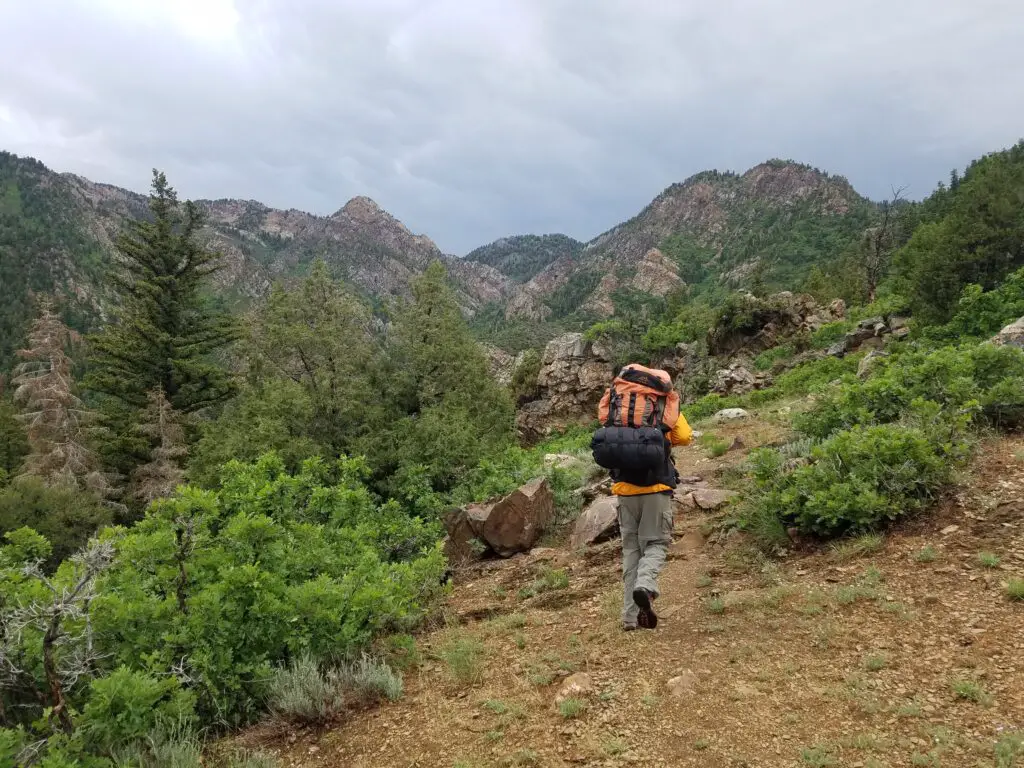
Pros and Cons of Backpacking
The camping advantages and disadvantages listed above pretty much all apply to both camping and backpacking, but backpacking has its own advantages and disadvantages.
Advantages of Backpacking
Remoteness
Remember in the movie Back to the Future when Marty tells Doc the road isn’t long enough and he says, “Roads? Where we’re going, we don’t need roads!” That’s how I feel about backpacking.
My favorite part about backpacking is just being able to ditch the car and the roads and head out on a little trail into the woods. You’re only limited by how far your legs can haul you and how much you can fit on your back.
Camping is a great way to get away from crowds, and backpacking is a great way to get away from people. Occasionally you still pass day hikers on the trail or see the occasional tent tucked between the trees, but in many areas you can block out all human interactions.
Fitness
My other favorite thing about backpacking is the physical component. I like the challenge of camping and the voluntary hardship, but there’s not much of a physical aspect to it.
Hiking by itself is a good workout . It can be mostly enjoyable and you can go as fast or slow as you want. You can also often turn back whenever you want and make the trip as short or as long as you want.
. It can be mostly enjoyable and you can go as fast or slow as you want. You can also often turn back whenever you want and make the trip as short or as long as you want.
Backpacking with a 35lb (16kg) backpack is hard work. You usually have a destination in mind as well, which means you can’t just turn back or stop whenever you want. Going slow is an option, but the weight just feels heavier and heavier the longer you go.
I still consider this an advantage of backpacking. You don’t need to go very far to escape the crowds in regular campgrounds. The fitness aspect also boosts the mental and physiological benefits of camping.
I wrote more about the physical requirements for backpacking in this article: Backpacking vs. Hiking
Simplicity
Whereas with camping you’re limited to the equipment you can fit in your car or camper, with backpacking it’s even better. All you can really bring is the bare necessities- a sleeping bag and pad, a stove and food, and maybe a tent.
This means you can really relax and focus on what’s important. Your mindset narrows down from worrying about the whole world to just worrying about your own subsistence for the night. It’s really relaxing and that feeling continues past the end of your trip.
Pain Points of Backpacking
The negatives of backpacking are pretty much just the opposite side of the advantages.
The remoteness means that if you get into trouble you are responsible for saving yourself. It’s definitely good to carry a Personal Locator Beacon or Satellite Messenger because often you won’t have cell service and there may not be anyone around to rescue you.
because often you won’t have cell service and there may not be anyone around to rescue you.
There’s also obviously a much higher likelihood that you’ll get lost and end up where people just don’t go. Because of this it’s important to learn to self-rescue and have some map skills (and a map).
The fitness portion can really be a challenge. It’s definitely easier if you keep yourself in good shape, and is certainly easier for certain age demographics.
I remember backpacking as a young teenager and really struggling to haul all of my gear up the mountain. We’d split tents between us to divide up some of the weight and still slog up the climbs. As I’ve gotten older I’ve found that the amount of gear I needed hasn’t increased, but I’ve gotten bigger and stronger and that makes all the difference.
If you’re not in great shape though or have other health conditions, backpacking may not be the best choice. Fortunately, you can adjust your distance and trail difficulty to meet your needs.
The simplicity of backpacking means that you have to go without some of what you thought were ‘essentials.’ Leave behind the extra changes of clothing, the extra snacks, and the dutch ovens for cooking- but be careful not to leave anything you need at home!
Additional Gear Required for Backpacking
Gear designed for backpacking is different than gear designed for camping. Backpacking gear weighs a lot less. You can still bring camping gear in your backpack, but you’ve got to be prepared to haul the extra weight.
The fact that backpacking gear is lighter than camping gear often means that the pads are less comfortable, the stove surfaces are smaller, and the sleeping bags aren’t as soft. These tradeoffs are inherent in backpacking gear, though you can sometimes spend enough money to buy gear that does both.
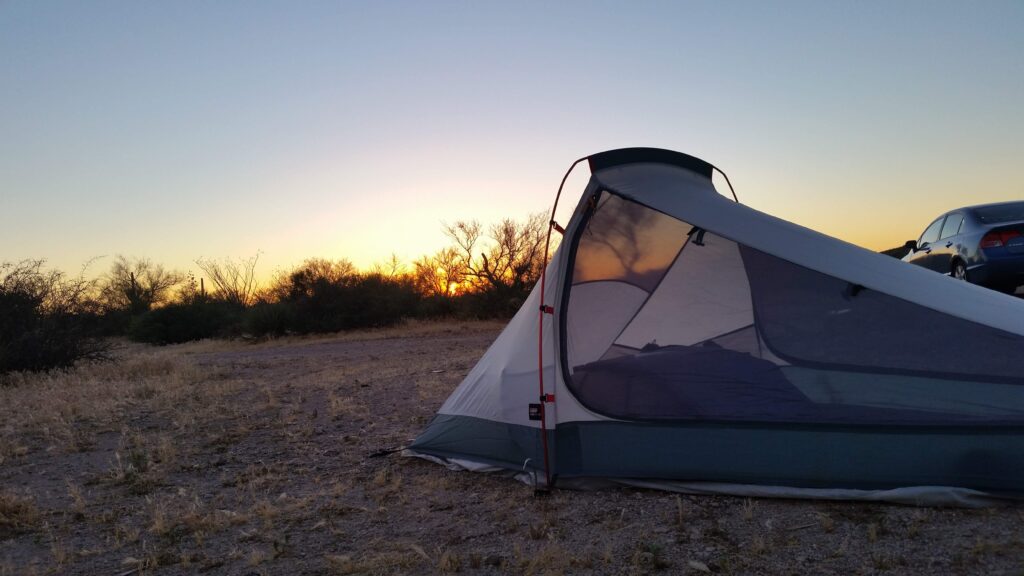
Backpacking Tents
A regular camping tent, like the one my small family uses , weighs about 10 pounds. Larger tents, or tents made from super-durable materials like thick canvas can weigh as much as 30 or 40 pounds. They’re usually roomy enough to kneel or stand inside and big enough to store some stuff inside and sleep several people.
, weighs about 10 pounds. Larger tents, or tents made from super-durable materials like thick canvas can weigh as much as 30 or 40 pounds. They’re usually roomy enough to kneel or stand inside and big enough to store some stuff inside and sleep several people.
Backpacking tents weigh more like 4-6 pounds for a 2-3 person tent. Ultralight setups can be even lighter than that. These tents come with a really thin groundcloth that should be supplemented with a tarp to keep rocks from tearing through and to keep water out.
In backpacking tents the rainfly usually extends quite a bit out past the edge of the tent so you can cover your gear inside the enclosure to keep it dry. That saves on weight, and you can also leave the rainfly behind if the weather forecast is clear.
A 4-season tent is a lot heavier and warmer than a 3-season tent. If you plan on camping in colder regions or year-round, make sure to go for the 4-season backpacking tent.
Backpacking Stoves
A backpacking stove consists of just a small burner connected to a small bottle of propane or butane. There’s usually some assembly involved, and it can be difficult to do much more than just boil water on them.
Don’t plan on making any gourmet multi-course meals while backpacking. Extra pans are heavy! Most people spend the $10 for the freeze dried meals from Mountain House (my favorite is the lasagna ), which is a good way to go. Just add boiling water, wait a few minutes, and you’ve got the best meal you’ve ever tasted.
), which is a good way to go. Just add boiling water, wait a few minutes, and you’ve got the best meal you’ve ever tasted.
Backpacking Sleeping Bags
Just about everyone is familiar with big, comfy, car camping sleeping bags. They’re just about thick enough that you don’t need a pad underneath you. The only problem is trying to fit a huge back like that in your backpack!
Backpacking sleeping bags are usually mummy bag style, which means they fit a lot more snugly than the big rectangular car bags. They’re also usually made from synthetic materials rather than cotton and filled with down (feathers) in order to save on weight.
You can still get a really warm backpacking bag, but you do have to pay a little more for every 10 degrees colder you go. The right bag for you depends on where (and what time of year) you plan to camp, but a 20 degree bag is pretty standard. I’ve got this one .
.
A good compression bag is necessary in order to fit a nice sleeping bag into a small compartment on your backpack. The bags have straps that you can cinch to get the bag as small as possible.
It’s usually a good idea to supplement your sleeping bag’s warmth rating with warm pajamas like sweats or thermals, or a sleeping bag liner or blanket. It can give you an extra 10-20 degrees on cold nights.
Backpacking Sleeping Pads
The pad is just about the most important part of your backpacking kit. It’s not only important because it makes it more comfortable to sleep, but it also insulates you from the cold ground.
In the past everyone used foam mats, like yoga mats. When I started backpacking we used old green army surplus pads that were about as cushy as you’d expect for a bunch of 20-year old soldiers. In hindsight, rolled up cardboard might have been softer!
Now backpackers pretty much all use inflatable pads. They’re much more durable than they were in the past and can be repaired on the go if necessary. Nicer ones have a combination of foam and air. The air provides the comfort and the foam takes the edge off.
Backpacking Packs
Of course, the other necessary piece of gear you need for backpacking is a backpack. With backpacking packs you have two choices- internal and external frames.
The traditional backpacking pack is the external frame. It kind of looks like you have a folding lawn chair strapped to your back. It’s easy to strap your larger items like your tent, sleeping bag, and pad to the outside of the frame and then put the smaller stuff inside the pack.
Now everyone pretty much uses internal frame packs in order to conserve weight versus the aluminum frame. Internal frame packs are also a lot more comfortable because it molds around your back, but they’re also usually hotter to wear for the same reason.
Packs range in size from around 45L as the smallest that can be used up to 90L at the largest. For most weekend trips, 50-65L is enough to get all your gear comfortably.
Backpacking packs are pretty expensive, but can be had for cheaper from yard sales and second-hand stores if you’ve got time to look around.
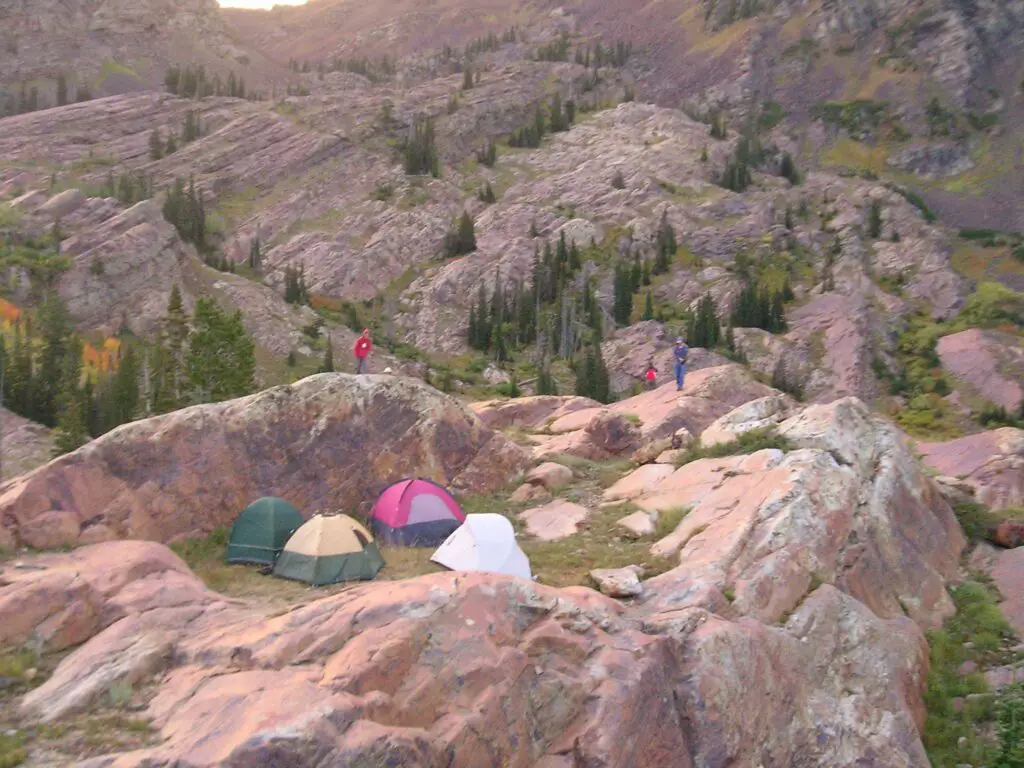
Tips for Backpacking
I’ve got a lifetime’s worth of tips for backpacking, but we don’t have that kind of time! Here are some of the most important hacks that I’ve picked up.
Hiking Boots are Antiquated
When I see thick leather hiking boots, the first thing that I think of is blisters! Big hiking boots have their place- in the historical record.
Unless you have a history of bad ankles or are hiking through really nasty terrain with sharp rocks and thorns, hiking boots are just extra deadweight. They’re generally not very comfortable, aren’t breathable, and are pretty expensive.
I’ve found that the best hiking shoes are trail running shoes. They are engineered to be comfortable, durable, breathable, and to provide more traction that regular running shoes. Once I switched over to trail runners, I’ve never looked back.
Compression Bag for Sleeping Bag
Weight is obviously an issue, but so is the space. Sleeping bags last a lot longer if they’re stored laid out rather than in their bags because otherwise the filling gets matted together and you get cold spots.
I store my family’s sleeping bags stacked under a bed. Then I have compression sacks for them to fit into the smallest possible space when we load them into our backpacks. The straps help to really crunch everything down so I can fit everything I need for a trip.
Leave the Rain Fly (or the Tent) Behind
The tent is usually the heaviest piece of equipment that you carry on a backpacking trip, especially if you don’t have one specially engineered for backpacking. A lot of tents have mesh panels around the top to save on weight and to enhance airflow.
If you aren’t expecting rain or snow, I recommend leaving the rain fly (or the whole tent if possible) behind. Enjoy a night under the stars instead. Then you will enjoy it when you wake up 5 times during the night uncomfortable!
Use a Painting Drop Cloth for a Groundcloth
Another hack that I’ve used for a long time is to buy a $2 plastic painting drop cloth from a hardware store instead of using a thick tarp. Not only do you save on weight and price, but you can easily cut it to fit the exact footprint of your tent.
They’re usually small enough to fit right in the bag with your tent as well so that you don’t accidentally forget it at home. It would also work as a makeshift solar water distiller in a survival situation.
Use Rolled up Clothing as a Pillow
My dad trained himself to not need a pillow at night just so that he could sleep better while camping. I’m not quite that dedicated I guess, because I need something under my head. Pillows take up a ton of space, even if you stuff them into your pack.
Inflatable pillows are an option, but they’re still quite a bit harder than a regular pillow and are prone to leak. The best thing to do is to just roll up your clothes for the next day or your jacket and is them as a pillow instead. One less thing to worry about.
Variations of Backpacking
The term ‘backpacking’ does mean different things in different places. Throughout the continental US, backpacking pretty much always refers to the type I’ve described in this article- a combination of hiking and camping.
Backpacking or Trekking Europe or Asia
The European style of backpacking or trekking is different. Backpackers, often college-age students, go from city to city staying in hostels and carrying everything they need in packs.
It’s a pretty bare-bones approach to travel that can be done cheaply thanks to the abundance of hostels and public transportation. Travelers really get to be more immersed in the local culture and cuisine than they would in hotels and rental cars.
Through-Hiking
Have you heard of someone doing the Appalachian Trail or the Pacific Crest Trail? This style of backpacking is where someone starts at one point and hikes to another point over a longer period of time like a few months.
Bikepacking
Rather than carry everything on your back, you strap it all onto your bike. It can be done as road biking or mountain biking, meaning you can go just about anywhere you want.
It’s a lot faster than backpacking, but can be hard to fit everything you need on a bike. You’ve also got to be prepared to do some maintenance as you’ll inevitably break down somewhere!
Related Questions
Does Backpacking include Camping? Backpacking is a combination of hiking and camping where hikers carry all of their camping gear in a backpack. Backpacking can also refer to trekking in Europe and staying in hostels rather than camping.
What is Overnight Hiking Called? Overnight Hiking is called Backpacking in the United States and elsewhere in the world. It is a combination of camping and hiking, as hikers carry their camping gear on their backs.
Is 5 Pounds Heavy for a Backpacking Tent? A 5 pound backpacking tent for 1-2 people is average weight for a backpacking tent. If the tent fits 3-4 people, then 5 pounds is lightweight. A backpacking tent for 1-2 people should weigh 4-6 pounds, though more expensive models can weigh as little as 2 pounds.
